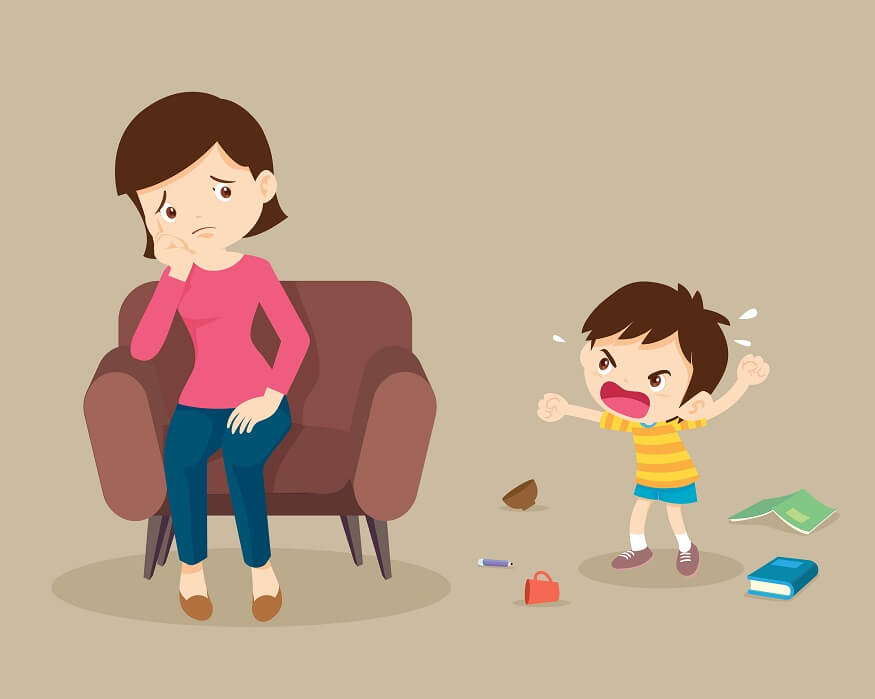Temper tantrums are a normal aspect of development, reflecting a child’s struggle with burgeoning emotions and independence. Managing these outbursts requires understanding, patience, and consistent strategies from caregivers, fostering emotional literacy and teaching children more appropriate ways to express their feelings.
Temper Tantrum: Meaning
Temper tantrums, a common phenomenon in child development, are characterised by an intense and often explosive expression of anger or frustration. The display can encompass various forms, including crying, screaming, stomping of feet, throwing things, or even physical aggression. This kind of outburst is frequently seen in young children, typically between ages one and four, as they are learning to navigate their emotions and exert independence, although older children, teens, and even adults can sometimes exhibit these behaviours.
Causes of temper tantrum
Temper tantrums are a normal part of child development, often occurring between the ages of 1 and 4. They’re typically most common in toddlers, with the frequency of tantrums generally decreasing as children get older and learn better coping strategies for frustration and disappointment. Here are some common causes of temper tantrums:
Frustration: Tantrums often occur when a child is unable to accomplish something or when they can’t express their feelings or needs. This is particularly common in younger children who may not have the language skills to express themselves yet.
Seeking Attention: If a child feels ignored or left out, they may throw a tantrum to get the attention of parents or caregivers.
Tiredness or Hunger: When children are tired or hungry, they are more likely to have temper tantrums. Their tolerance for frustration is lower, and they may have difficulty controlling their emotions.
Overstimulation: Too much noise, activity, or new experiences can be overwhelming for children, leading to tantrums.
Transitions: Difficulty with transitions or changes in routines can also lead to tantrums. Children often struggle with moving from one activity to another, especially if they are enjoying the current activity.
Unmet Needs or Desires: When children want something they can’t have, they may react by throwing a tantrum. This could be a toy, food, or even wanting to go to a place they like.
Power Struggles: As toddlers grow, they begin to seek independence and control over their environment. When their desires clash with what their parents or caregivers allow, it can lead to a power struggle and a tantrum.
Lack of Skills: Sometimes children become frustrated when they are not able to do something due to lack of skills. This frustration can lead to tantrums.
Emotional distress: Any form of distress, fear, anxiety or emotional upset can potentially trigger a tantrum.
While occasional tantrums are a normal part of child development, frequent tantrums or those that involve harmful behavior (like hurting oneself or others) can be a sign of underlying emotional or developmental issues. If you’re concerned about your child’s tantrums, it may be helpful to consult with a pediatrician or a child psychologist.
Also Read: Delayed Gratification: Meaning and Benefits in child psychology
Managing temper tantrum
Managing temper tantrums begins with understanding their causes. Common triggers include hunger, tiredness, discomfort, or the inability to get what they want. Sometimes, a child may throw a tantrum when they struggle to express their feelings or emotions due to their limited vocabulary.
Older children or teenagers might do so when they feel unheard or invalidated. Being proactive can help prevent tantrums from happening in the first place. Keeping children’s physical needs met, helping them learn to use words to express their feelings, setting consistent and age-appropriate limits, and providing them with choices whenever possible can make a significant difference. Here are some quick ways to manage temper tantrums:
Stay Calm: It’s important to remain calm and composed during a child’s tantrum. Your calmness can help to de-escalate the situation.
Ignore the Tantrum: If the tantrum is not harmful and is a means for the child to seek attention, ignoring it can be an effective method. The child will eventually learn that throwing a tantrum doesn’t yield the desired result.
Use Distractions: Diverting the child’s attention to something else can help to stop a tantrum. This could be a favourite toy, a different activity, or pointing out something interesting in the environment.
Validate Their Feelings: Even though the reaction may seem over the top, the emotion the child is feeling is real. Acknowledge that you understand they’re upset, which can sometimes help to calm them down.
Teach them Self-Regulation: Once the tantrum has passed, teach your child about emotions and how to manage them effectively. This could be through deep breathing exercises, counting to ten, or using words to express their feelings.
Provide Consistent Responses: Be consistent in your reactions to tantrums. If a child learns that a tantrum will sometimes yield the desired result, they’ll continue to use this strategy.
Ensure Basic Needs Are Met: Often, tantrums can be the result of a child being tired or hungry. Try to prevent tantrums by making sure these basic needs are met.
Remember, every child is different and what works for one may not work for another. To determine which approach or mix of approaches works best for your child, you might need to experiment.
Also Read: 10 Ways to Improve Social Skills in Toddlers
Temper tantrum treatment
It can be required to seek professional assistance, such as from a child psychologist or psychiatrist, in order to handle chronic or severe tantrums. Techniques such as cognitive behavioural therapy (CBT) may be employed to help children better understand and manage their feelings. Parent management training can also be beneficial, teaching caregivers effective strategies to handle tantrums and promote better behaviour.
For older children and teens, mindfulness techniques and stress management skills might be particularly helpful in preventing and managing tantrums. These techniques can teach them to recognise the physical signs of rising anger and frustration and take proactive steps to calm themselves before a full-blown tantrum occurs.
Also Read: Six Stages of Kohlberg’s Theory of Moral Development
EuroSchool is committed to supporting the emotional needs of its students. Wе support studеnts’ succеss in both thеir acadеmic and еmotional dеvеlopmеnt by offеring a widе rangе of programmеs and initiativеs as wеll as fostеring a sеcurе and еncouraging еnvironmеnt.










